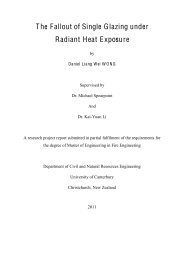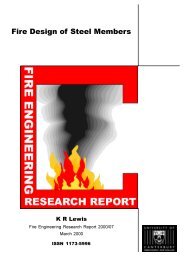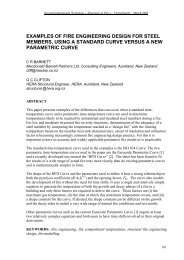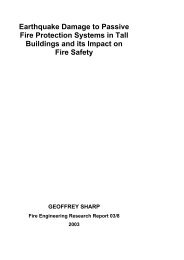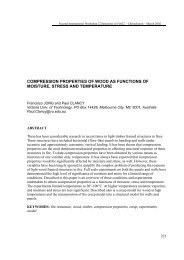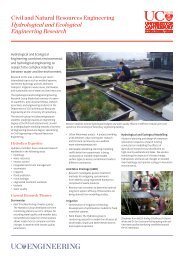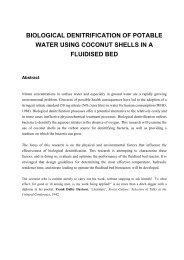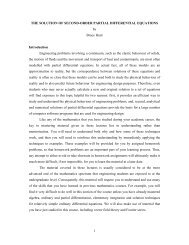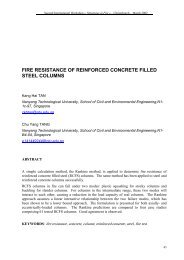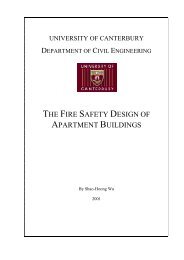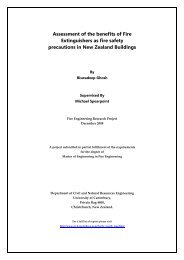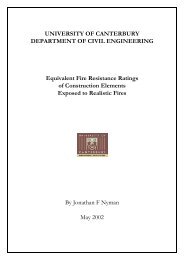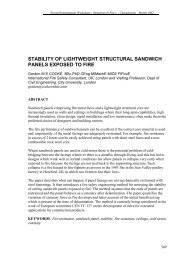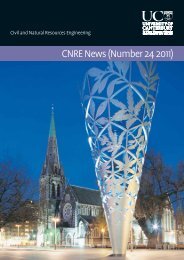University of Canterbury Department of Civil and Natural Resources ...
University of Canterbury Department of Civil and Natural Resources ...
University of Canterbury Department of Civil and Natural Resources ...
You also want an ePaper? Increase the reach of your titles
YUMPU automatically turns print PDFs into web optimized ePapers that Google loves.
2. Bachelor <strong>of</strong> Engineering (Honours)<br />
2.1 Introduction<br />
On entry to the School <strong>of</strong> Engineering all students are enrolled in the Bachelor <strong>of</strong><br />
Engineering Honours degree programme. This programme is comprised <strong>of</strong> three<br />
pr<strong>of</strong>essional years <strong>of</strong> study.<br />
The <strong>Department</strong> <strong>of</strong> <strong>Civil</strong> <strong>and</strong> <strong>Natural</strong> <strong>Resources</strong> Engineering hosts two separate<br />
degree programmes in <strong>Civil</strong> Engineering <strong>and</strong> <strong>Natural</strong> <strong>Resources</strong> Engineering. These<br />
two programmes have some elements in common, as can be seen below, but they<br />
are also quite distinct by the final year <strong>of</strong> study. In the sections below the courses<br />
that comprise each pr<strong>of</strong>essional year are listed together with their course<br />
prescriptions.<br />
On completion <strong>of</strong> your degree you will be awarded, either a BE(Hons) degree with<br />
first class, second class (divisions 1 <strong>and</strong> 2) or third class honours, or a BE degree<br />
without honours. The level <strong>of</strong> honours attained is based on your performance<br />
during the second <strong>and</strong> third pr<strong>of</strong>essional years. These are weighted 20% <strong>and</strong> 80%<br />
respectively. To be eligible for honours a student must complete the three<br />
pr<strong>of</strong>essional years in no more than four years <strong>of</strong> study <strong>and</strong> take no more than two<br />
years to complete any one pr<strong>of</strong>essional year.<br />
2.2 First Pr<strong>of</strong>essional<br />
2.2.1 Overview<br />
The first pr<strong>of</strong>essional year <strong>of</strong> study for both the BE(Hons) (<strong>Civil</strong>) <strong>and</strong> BE(Hons)<br />
(Nat Res) is common. The courses provide a broad introduction to key areas such<br />
as structures, geomechanics, fluid mechanics, transportation <strong>and</strong> GIS, <strong>and</strong><br />
environmental engineering. In addition, key skills in design, mathematics <strong>and</strong><br />
computation are developed.<br />
All <strong>of</strong> the courses listed below are compulsory. In special circumstances students<br />
may be permitted to alter their First Pr<strong>of</strong>essional courses. Cases for exemptions <strong>and</strong><br />
alterations are considered on a case by case basis <strong>and</strong> these should be presented to<br />
the 1 st Pr<strong>of</strong>essional year co-ordinator.<br />
5<br />
`



